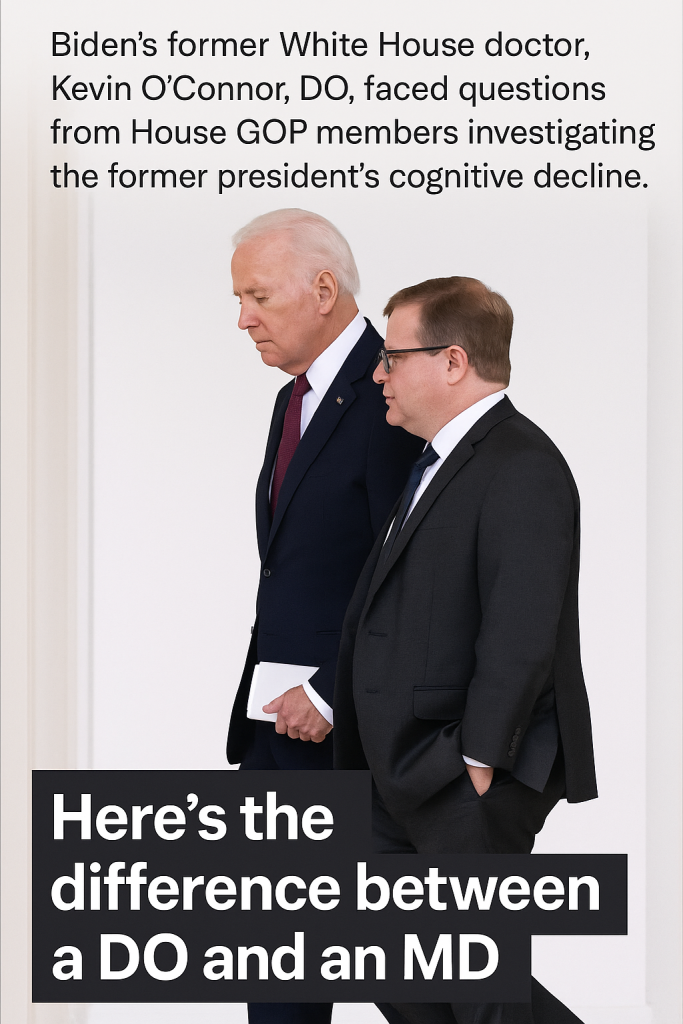Kevin O’Connor, DO, who served as President Joe Biden’s White House physician, recently came under scrutiny during a House GOP-led investigation probing concerns about the former president’s cognitive health. The line of questioning focused on Dr. O’Connor’s medical assessments, sparking renewed public interest in the credentials and roles of Doctors of Osteopathy (DO) compared to traditional Medical Doctors (MD).
In early 2024, House Republicans intensified their inquiry into President Biden’s mental acuity, raising questions about whether his cognitive decline impacted his performance while in office. As the former White House doctor, Dr. O’Connor was called to testify and provide answers about Biden’s health evaluations during his tenure, placing a spotlight not only on the findings but also on the qualifications of the physician involved.
Who is Kevin O’Connor, DO?
Kevin O’Connor held the critical role of White House physician, responsible for monitoring and reporting on President Biden’s physical and cognitive well-being. His testimony before Congress came under fire as GOP members pressed for details, seeking to understand the rigour and nature of the cognitive assessments administered. As a Doctor of Osteopathic Medicine, Dr. O’Connor’s medical approach combines traditional medicine with a holistic focus on the musculoskeletal system and preventive care.
DO vs. MD: What’s the Difference?
Many Americans may be unfamiliar with the DO designation. Doctors of Osteopathic Medicine (DOs) and Medical Doctors (MDs) both hold fully licensed physician status in the United States, but they are trained under distinct philosophies and educational paths.
- Training and Education: Both DOs and MDs complete four years of medical school, followed by residencies and fellowships. DO programs include additional coursework in osteopathic manipulative treatment (OMT), a hands-on technique used to diagnose and treat musculoskeletal issues.
- Philosophical Approach: DOs emphasize a holistic treatment philosophy, considering the whole patient rather than just the presenting symptoms, and incorporating preventative care principles. MDs are generally trained in allopathic medicine, which focuses more on diagnosis and treatment using pharmaceuticals or surgery.
- Licensing and Practice: Both DOs and MDs are licensed by state medical boards and can specialize in any medical field. They can prescribe medication, perform surgeries, and serve as primary care physicians or specialists. Patient outcomes and care quality are comparable between the two credentials.
Why Does the Distinction Matter in This Investigation?
Some critics have used the fact that Dr. O’Connor is a DO to challenge the validity or depth of his cognitive assessments of President Biden. However, many medical experts emphasize that the distinction does not impact a physician’s ability to provide accurate health evaluations or administer cognitive testing. Both DOs and MDs routinely perform comprehensive physical and mental examinations, especially those in high-profile roles like White House physicians.
Furthermore, Dr. O’Connor’s responsibility included administering standard cognitive tests and evaluating neurological function, areas well within the expertise of any licensed physician, regardless of DO or MD credentials.
Political and Public Reactions
The investigation into Biden’s cognitive health remains a politically charged topic, with partisan debates often overshadowing the medical facts. House GOP members argue that transparency about the president’s health is paramount for national security, while critics view the inquiry as politically motivated.
Meanwhile, medical professionals caution that cognitive decline assessments require careful interpretation and should not serve as ammunition in political battles. They stress the importance of



